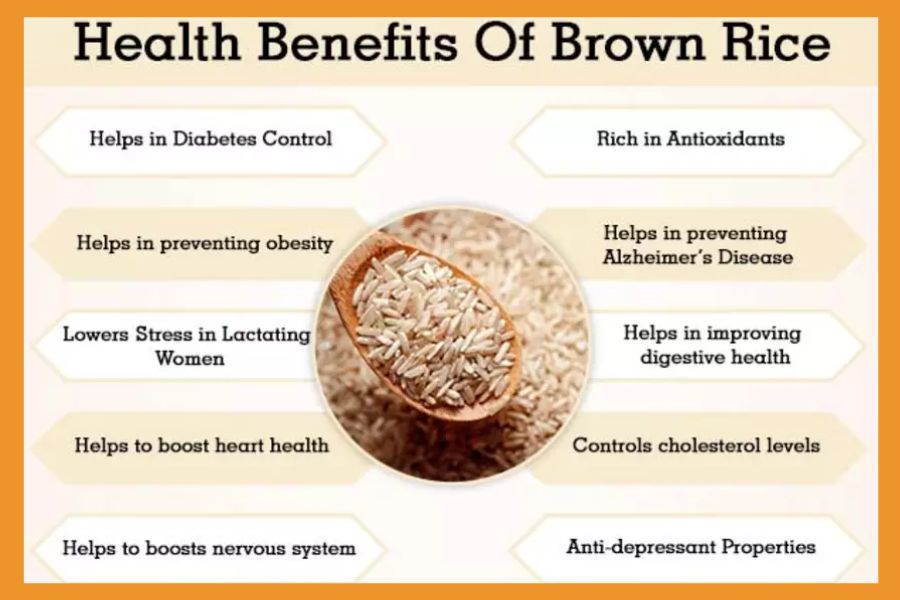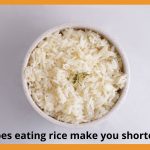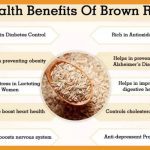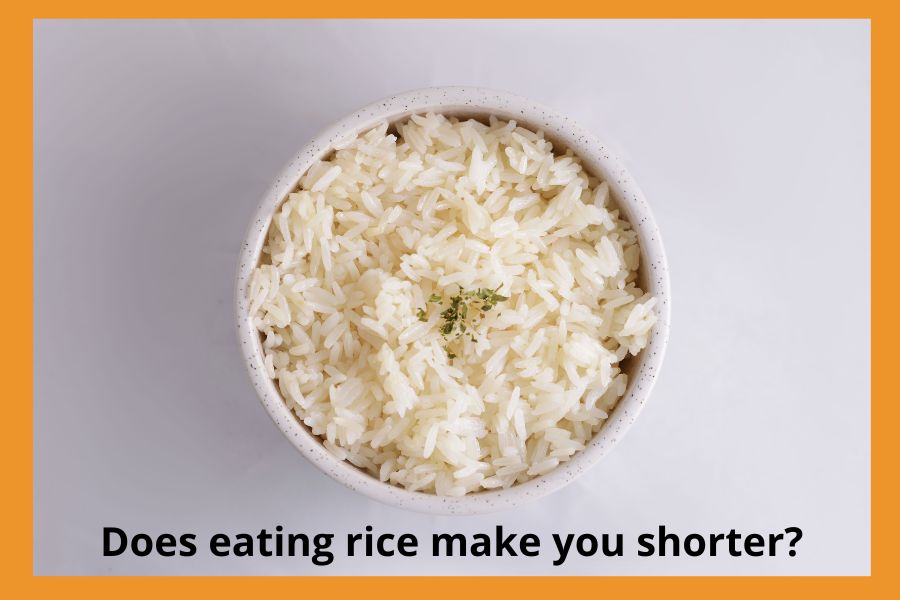The idea that eating rice make you shorter is common. But what do you really think? Does rice make you shorter? This belief relates to the fact that Asians are generally shorter than Americans and Europeans in height. They believe this is due to their affection for rice. They believe that any use of rice is a direct cause of their diminutive size. Can rice, therefore, make you really shorter?
Before explaining this, let me start with some important information regarding rice.
- A Brief Introduction to Rice
- Bursting Myths : Is Rice Make You Shorter?
- Reasons Why People Think, Does Rice Stunt Growth In Height.
- Rice Nutrition value
- Calories
- Health Advantages Of Eating Rice
- It delivers instant energy.
- Many Available Varieties of Rice.
- Specialty rice varieties include:
- Is rice make you really shorter, Let me conclude.
A Brief Introduction to Rice
Oryza sativa, a cereal food plant, belongs to the Gramineae grass family and is widely cultivated in warm areas, particularly in East Asia. Its seeds are cooked and consumed as food. The Greek and Arabic words for the Ningpo dialect of the Chinese word Ouliz, Oruz and Oryza, respectively, were transformed into Ritz and Rice.
More than half of the world’s population uses rice as a staple food, largely because of its adaptability, availability, and ability to take on any flavor or seasoning. White rice has a soft, chewy texture that gives meals substance and goes well with many different cuisines.
Rice is edible and is primarily consumed in Asia, Latin America, and portions of Africa. Asia is where it is primarily grown. Rice is a staple cuisine in Indonesia, China, and India, where it is frequently consumed for both lunch and dinner. Numerous health advantages of rice include the ability to control diabetes, enhance digestive function, lower the risk of cancer, increase immunity, maintain blood pressure, and more. Due to its naturally high nutritional value, it is accepted as the primary food in many countries.
Bursting Myths : Is Rice Make You Shorter?
Despite being consumed in India from birth to death and being a part of many traditions and customs, it is one of the foods that receives the most criticism in the modern health sector. From basic energy to cardiovascular and digestive health to aging prevention, it has several advantages. It is naturally non-allergic, gluten-free, and has a high protein digestibility rating.
Myth: The glycemic index of rice is high.
It is customarily consumed with ghee, which decreases the GI of meals, along with dal, sabzi, meat, and dahi.
Myth: Rice is starchy.
Fact: Rice is not starchy. The amount of starch left in cooked rice is less than 10%. Since starch is the source of our energy, we must have it.
Myth: Ignore rice at night because it is a carb.
No food contains only carbohydrates, proteins, or fats. Along with carbs, rice contains a variety of vitamins, phytonutrients, and vital amino acids. A vital amino acid found in rice called lysine serves as a precursor to human growth hormone. HGH reaches its peak at night and aids the body’s vital growth and repair processes. Therefore, giving rice at night would enable this hormone to peak at its best.
Myth: Rice makes you short.
Fact: Your genetics, diet, and level of physical activity all have a significant role in how tall you become. rice, which is a staple of our diet, has no discernible impact on our height
Myth: Eating too much rice is unhealthy.
Fact: Anything in excess is harmful. Therefore, eat some rice and pay attention to your stomach’s satiety cues.
Myth: I prefer brown rice rather than white.
Fact: Eating rice that has been hand-pounded or single-polished contains the ideal amount of fiber and other nutrients despite being white in appearance.
Myth: Before eating, destarch the rice.
Fact: Removing the water eliminates not just the anti-aging nutrients, but also the vital component of the starch. Additionally, it should be used in different ways even if you remove it from rice in order to reap the benefits.
Reasons Why People Think, Does Rice Stunt Growth In Height.
Basically, one’s genetics, diet, and level of physical activity all have a significant role in how tall one becomes. When it comes to how tall one can be, genetics is the most significant factor. Having said that, nutrition also has a minor impact on how tall a person is. In moderation (180-250 grams), rice, which is a staple of our diet, has no discernible impact on our height. However, it may indirectly alter your height. We usually experience this when we regularly consume too much rice.
Growth retardation can result from rice, if you eat too much of it.
Overeating rice has the side effect of causing type 1 diabetes. Due to inadequate glycemic control, type 1 diabetic children may experience growth retardation and delayed pubertal development. Although this isn’t directly tied to normal growth and development, it can have some impact regardless of height.
Lethargy is developed in rice, which may contribute to small stature.
One may feel drained and lethargic after eating rice. The only reason Asians typically eat rice for dinner is to help them sleep well at night. This is also linked to increased weight in the individual. Physical activity has a significant role in enhancing the overall growth and development of your body, in addition to genetics and diet. When you eat too much rice, your body may become extremely lethargic and fatigued. As a result, one simply feels too worn out to engage in any physical activities. Your height may indirectly be impacted by this.
Rice is a food high in carbohydrates, This may shorten you.
You will always benefit from a diet high in protein as your body grows and develops in general. Protein is thought of as the foundation of our body’s systems. But while rice is high in carbohydrates, it has very little protein. Therefore, rice has no impact on how tall you are. However, eating excessive amounts of rice, which is high in carbohydrates but low in protein, will stunt your overall growth , this could be a reason for people to say rice may shorten you. Therefore, it is advised to incorporate all kinds of protein-rich foods in your diet if it consists primarily of rice or other high-carbohydrate foods.
Read more about the nutrition facts and health benefits of rice below.
Rice Nutrition value
The USDA provides the following nutritional data for 1 cup (186g) of cooked, enriched, short-grain white rice.
- Calories:242
- Fat:0.4g
- Sodium:0mg
- Carbohydrates:53.4g
- Fiber:0.6g
- Sugars:0g
- Protein:4.4g
- Manganese:0.7mg
- Iron: 2.7mg
- Thiamin: 0.3mg
Calories
Short-grain cooked white rice contains 242 calories per cup (186g). This is made up of 7.2% protein, 1% fat, and 88% carbohydrates.
Health Advantages Of Eating Rice
A diet that is well-rounded can include white rice. The vitamins and minerals that rice contains an account for a large portion of its health advantages.

Helps to support the bones, nerves, and muscles.
White rice has 14.9 mg of magnesium per serving, which might help you meet the 420 mg daily allowance.
1 Magnesium, a structural component of bones, is important for normal nerve conduction and muscle contraction as well as for hundreds of enzyme activities that help create DNA and proteins.
It improves colon health.
When rice is cooked and cooled, its resistant starch content increases. 3 According to studies, resistant starch can create certain fatty acids that support colon health. Additionally, these fatty acids might lower the risk of colorectal cancer.
Safe for Celiac Disease Patients
Since rice is a naturally gluten-free grain, both those with celiac disease and those with non-celiac sensitivity can benefit from its use. Bread, noodles, syrup, and flour can all be manufactured from rice. Additionally, it can be turned into milk and used as a non-dairy alternative to cow’s milk.
As cross-contamination might happen if other grains are processed in the same factory, it is preferable to purchase rice brands from certified gluten-free facilities if you have celiac disease.
It delivers instant energy.
White rice is a good source of energy for athletes who require a lot of carbohydrates. Because white rice has more carbs and less fiber than brown rice, many people prefer it. 5 Fiber helps prevent blood sugar increases by slowing down digestion.
But you’ll benefit from having white rice along with post-workout protein if you want those sugars to provide you with instantly usable energy or the insulin rise that aids in muscle growth after strength training.
Many Available Varieties of Rice.
Based on the size of the seeds, different rice varieties are categorized. Long-grain, medium-grain or short-grain rice are all available. There are many processing methods used with these cultivars.
For instance, converted rice is parboiled to get rid of the surface starch. It is now simpler to pearl using manual techniques. Compared to conventional milled white rice, converted rice cooks more quickly and maintains more nutrients. After being refined, vitamins and minerals are added to the rice that has been enriched.
Rice for instant or quick cooking is fully cooked before being quickly frozen. Although some flavor and nutrients are lost throughout this process, the result is rice that cooks quickly. 11
Specialty rice varieties include:
Rice with a short grain and a mild flavor is called Arborio. It is well-known for its use in risotto and other Italian meals.
- Sticky rice (also known as sticky rice or sweet rice): Many Asian cuisines use short-grain rice. Dumplings can be made using the flour that is made from it. Japanese sake and rice vinegar are also made with it.
- Brown rice: whole grain rice high in fiber. Cooking time is typically longer than with white rice.
- Long-grain kinds of rice with distinctive flavors and smells include basmati and jasmine.
- Wild rice is an aquatic plant unrelated to the more common rice that produces seeds that resemble reeds. It offers more vitamins, minerals, and fiber than white rice variants and is frequently served as a side dish.
- Long-grain rice with a nutty flavor and a powerful scent is wild pecan rice.
Which verity of rice is good, does rice is good for health? In this video everything is clearly explained, Please go through this.
Is rice make you really shorter, Let me conclude.
Don’t worry, the rice you served for supper last night won’t stop you or your kids from growing, but it has been proven that a diet high in carbohydrates and low in protein causes children to grow more slowly. However, children who eat a balanced diet that includes both protein and carbs are more likely to grow to their full adult height.
-
Is rice make you really shorter ?

Eating rice will not affect your growth, however excessive intake of rice and less intake of other food may affect your overall growth. Always try to take balanced diet. That will keep you healthy and will give your kid proper growth and development
-
What are the health benefits of eating rice?

There are many advantages for having rice with your daily meals.
It is good for your colon
It is a good source of carbohydrate hence give you energy boost
Vitamins in the rice bran is good for your body
It help to strengthen your bones and muscles
- Step By Step Turmeric Milk (Golden Milk) Preparation - July 18, 2024
- 18 Incompatible Food or Viruddha ahara List And Details (2024) - July 8, 2024
- A Yoga Meditation To Connect To Power In 2024 - December 11, 2023

